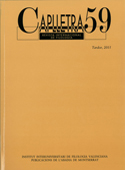Neology and Grammar: between lexical neologism and syntactic neologism
DOI:
https://doi.org/10.7203/caplletra.59.6905Keywords:
neology, lexical morphology, semantics, syntactic change, verb alternations Abstract
Abstract
Abstract: This work is an attempt to clarify the concept of syntactic neology with the aim of finding a working taxonomic device. My proposal is to use the label syntactic neologism to refer to those changes in verbal government that are not linked to semantic change (which would qualify as semantic neologism), nor to other word formation procedures. Thus, a syntactic neologism is not a lexical neologism, a new word, as indeed is the case with semantic neologism. Nevertheless, when we say that syntactic neologism excludes semantic changes, we do not refer to the meaning related to the structural properties (thematic roles and aspect) that determine regular syntactic alternations in verb classes. Therefore, if a new transitive causative variant is formed upon an unnacusative verb (which previously did not have that use) the result would be a case of syntactic neology. So syntactic neology reclassifies verbs, but does not create new verbs. In addition to that, syntactic neology can provide the verb with a new variant that places the verb outside established syntactic classes. In this case we would be approaching the sphere of syntactical change.Key words: neology, lexical morphology, semantics, syntactic change, verb alternations.
 Downloads
Downloads
Downloads
Published
How to Cite
-
Abstract694
-
PDF (Català)398
Issue
Section
License
Authors submitting work to Caplletra for publication must be the legitimate holder of the usage rights. Legitimacy for the purposes of publishing the work must also include images, tables, diagrams and any other materials that may complement the text, whether they are the author of such material or not.
Copyright: on publishing their work in the journal, the author grants Caplletra. Revista Internacional de Filologia usage rights (reproduction, distribution and public communication) for both the paper printed version and for the electronic version.
All work published in Caplletra is covered by the Creative Commons license type Attribution-NonCommercial-NoDerivatives 4.0 (CC BY-NC-ND 4.0).
RESPONSABILITY
Caplletra. Revista Internacional de Filologia does not necessarily identify with the points of view expressed in the papers it publishes.
Caplletra. Revista Internacional de Filologia accepts no responsibility whatsoever for any eventual infringement of intellectual property rights on the part of authors.






